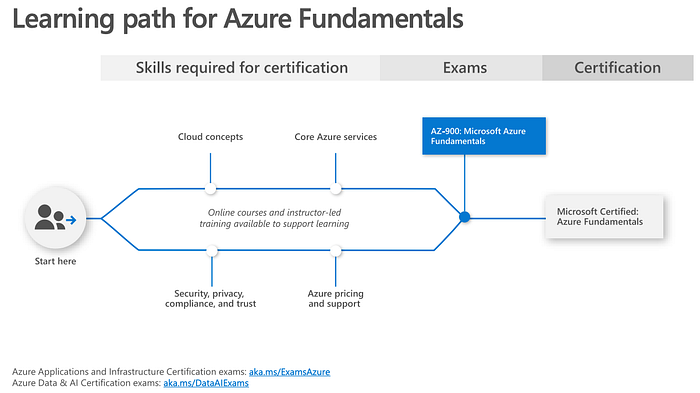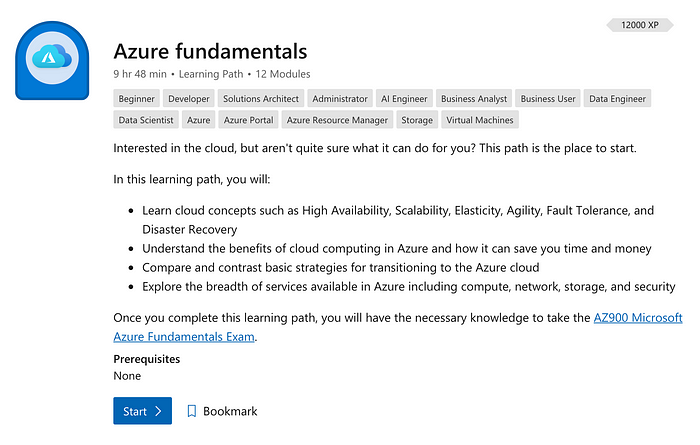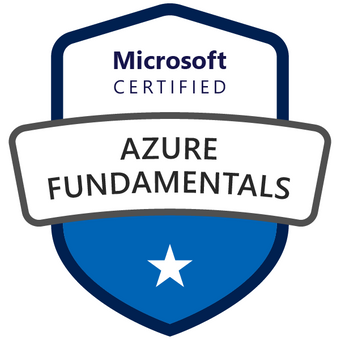Microsoft Azure Fundamentals AZ-900 : How to Prepare and Pass the Exam

The AZ-900 could be the best way for you to start your journey with Microsoft Certifications. Interest in learning more about Cloud and Azure is what got me to answer this examination.
Although people consider buying study materials like books and courses, I would suggest against it. I think there is already a lot of information present on the internet that you can make good use of. It took me around 2 days of dedication to completely prepare and pass this examination with a much higher score than I expected.
Here is all that you need to know about the exam and the preparation before getting started.
About the Exam
Microsoft Azure Fundamentals AZ-900 Exam has been designed for people from a non-technical background as well as tech people who want to verify their core Azure Cloud services skills. It is the first step in your path to development using Azure and helps you prove your fundamental knowledge in the domain.
Number of Questions — Varies from paper to paper (Mine had 42 questions)
Negative Marking — None
Time Duration of Exam — 60 minutes (Although 90 minutes is written on the exam, the extra time is for the pre-paper and post-paper proceedings)
Passing Percentage — 70% or a score of 700
Exam Location — In center or at home
Who should give this Exam?
If you are interested in learning about the cloud and working with Azure, then AZ-900 is just the certification for you. Whether you are a Student, a Software Developer, System Administrator, Sales and Marketing personnel, or into procurement, you can feel free to take this examination. Skills regarding cloud concepts always come in handy. AZ-900 welcomes everyone to write this examination irrespective of their technical background or skill.
The Azure Certification Roadmap

The AZ-900 Certification Examination is just the first step in building your career as a cloud expert. Based on your interest and role in the company, you can choose to answer the Associate Exam and then the Expert Exam. The Fundamentals exam is not a mandatory step for any path. However, the knowledge gained here will help form a base for your future courses. This exam also helps you understand the platform better if you are interested in Azure AI and Azure Data Path.
Cost of this Exam
Usually, the exam costs USD 99 (INR 3696). However, the costs can be reduced by applying a voucher.
How to answer the exam for FREE?
Yes, you read it right. You can avail of this examination for free of cost. How?
Microsoft has hosted a wonderful initiative called Microsoft Virtual Training Days. During these 1–2 days training sessions, Microsoft Trainers make attendees aware of all the concepts that are required to pass the certification exam, provide helpful resources and clear doubts that attendees have.
If you want to register for the Microsoft Azure Virtual Training Day: Fundamentals, you can register by clicking here. Select a time of your choice for the session. On attending the session successfully, the participants will receive a mail with information regarding the Certification exam within 5 working days. For more details on availing of the discount code, click here.
Prerequisites for the Examination
It would be good to have some basic idea about cloud concepts but it is not a necessity. You can start with no knowledge as long as you are willing to gain a lot of it on your journey to being certified.
Syllabus and Distribution

Through the exam, the major concepts of the cloud and their relation with Azure are tested. The following table shows the weightage of different study areas covered in the exam.

Types of Questions Asked
The exam presents questions of various types:
- Multiple choice: One correct response and three incorrect responses; two or more correct responses out of five or more options.
- True or False: Select Yes or No based on the righteousness of the statement.
- Drag and drop: Move the response to the correct description
- Hot area: Answer questions (screenshot, picture, or diagram) in a graphical form
How much time do I need to prepare for the AZ-900?
The time you take depends on your ability and will to learn. Considering full dedication from your side, 2 days of preparation are more than enough for being able to pass the exam.
It took me 2 days to complete the learning paths and then a day to practice. And trust me, I was very lenient in my preparation.
How to Prepare for the Exam?
It’s not really difficult to pass this exam with flying colours. I would suggest you to use the following resources to boost your preparation:
- Microsoft Learn Free Learning Path — A platform where the concepts are charted out and practicals can be done using the Learn Sandbox Subscription provided. Certain resources like Azure VMs are not provisioned by the Sandbox and hence will require an Azure Subscription. You can apply for a free subscription here if you have not already applied for one.
- AZ-900 Dumps — Previously asked questions from the papers. Refer to the discussion section from the website for more appropriate answers and explanations.

A tip to ace this exam would be using the following learning methodology:
- Complete the Learning Path by reading through and understanding concepts. Don’t struggle or rot-learn. Just understand and take in all that you can.
- Read through the AZ-900 Dumps. Initially, it might seem difficult and totally new. Don’t give up. Eventually, you will be able to solve them with much more ease. Note: Some of the answers mentioned there are erratic so make sure that you confirm the answers using the internet or by going through the discussion section.
- Redo the Learning Path for a better understanding.
Important concepts which are most commonly asked in the AZ-900 Certification
1. Basic Cloud Concepts
- Different Cloud Models — Understanding of Public, Private and Hybrid models, their advantages and disadvantages. How to choose the best model based on scenarios.
- Cloud Benefits — High Availability, Fault Tolerance, Scalability, Elasticity, Agility, Latency, Cost Considerations, Disaster Recovery. Understand the terms and their definitions well.
- Difference between CapEx and OpEx
- Difference between IaaS, PaaS, and SaaS — The following diagram should be embedded in your brain. It helps solve a lot of questions on the test.

- Serverless Computing — Difference between usage of Azure Functions and Azure Logic Apps
2. Core Azure Services

- Resources, Resource Groups, Subscriptions and Management Groups
- Regions, Availability Zones and Region Pairs— A region is a geographical area on the planet that contains at least one but potentially multiple datacenters that are nearby and networked together with a low-latency network. Regions are made up of one or more datacenters in close proximity. Availability zones are physically separate datacenters within an Azure region. Each Azure region is always paired with another region within the same geography (such as US, Europe, or Asia) at least 300 miles away.
- Special Azure Regions— US Government, China
- Compute — Learn about Azure Virtual Machines (VMs), App Services, Container Services (Container Instances, Kubernetes Services), Windows Virtual Desktop.
- Networking — Understand Virtual Network (VNet), Virtual Private Network Gateway (VPN), Express Route.
- Storage — These include Blob, Disk Storage and files.
- Databases — Understand the difference between and usage of Azure Cosmos DB, Azure SQL Database, Azure SQL Managed Instance, Azure Database for MySQL, Azure PostGreSQL
- Azure Marketplace
3. Azure Solutions and Management Tools
The learning path for this should be carefully attempted and completed. Understand the solution and the usecases. Be thorough with the factors that need to be taken into consideration before finalizing a solution.
- Internet of Things —Azure IoT Hub (Bi-directonal Communication), Azure IoT Central (SaaS), Azure Sphere (Security)
- Big Data and Analytics — Azure Synapse Analytics (Enterprise Data Warehouse), Azure HDInsight, Azure Databricks (Apache Spark based Analytics Service, used with Python, R)
- AI and Machine Learning — Azure Machine Learning (to train and deploy models for prediction), Cognitive Services (enables apps to see, hear, speak, understand and interpret a user’s needs), Azure Bot Service (for conversations).
- Serverless Computing — Azure Functions (Event based code), Azure Logic Apps (Orchestration service with workflows to integrate apps)
- DevOps — Azure Devops, GitHub, GitHub Actions for Azure, Azure DevTest Labs
- Management Tools — Azure Portal, Azure PowerShell, Azure Mobile App, Azure CLI, Azure Rest API, Azure Cloud Shell, Azure Resource Manager (ARM)
- Health — Azure Advisor (analyzes deployed Azure resources and makes recommendations based on best practices to optimize Azure deployments, especially cost), Azure Monitor ( maximizes the availability and performance of applications and services by collecting, analyzing, and acting on telemetry from cloud and on premises environments), Azure Service Health (Azure service issues responded with personalized guidance and support, notifications, and issue resolution updates).
4. Azure Security and Network Security
- Azure Security Center — Azure Security Center is a monitoring service that provides threat protection across both Azure and on premises datacenters.
- Policy Compliance, Security Alerts, Secure Score and Resource Hygiene
- Azure Sentinel — is a security information management (SIEM) and security automated response (SOAR) solution that provides security analytics and threat intelligence across an enterprise.
- Key Vault — stores application secrets in a centralized cloud location in order to securely control access permissions and access logging.
- Azure Dedicated Hosts — provides physical servers that host one or more Azure virtual machines that is dedicated to a single organization’s workload
- Network Security Groups — filter network traffic to and from Azure resources on Azure Virtual Networks. A lot of questions are asked from this concept.
- Azure Firewall — A stateful, managed Firewall as a Service ( FaaS ) that grants/denies server access based on originating IP address, in order to protect network resources.
- Azure DDoS Protection
5. Identity, governance, privacy and compliance
- Authentication vs Authorization
- Multi Factor Authentication
- Azure Active Directory
- Conditional Access
- Role Based Access Control (RBAC)
- Resource Locks — Read-only and delete
- Tags
- Azure Policy
- Microsoft Privacy Statement
- Trust Center
- Azure Sovereign Regions — US Government, Azure China
6. Azure pricing and lifecycles
- Factors affecting costs — A situational Question is usually asked based on this.
- Pricing Calculator, Total Cost of Ownership Calculator, Azure Cost Management
- Azure SLAs — Definition, uptime and calculation. Note: Calculations are not asked, but the method might be.
- Azure Preview Program — Public Preview and Generally Available (GA)
Perks of answering the AZ-900 Exam

On answering the AZ-900 Microsoft Azure Fundamentals Certification, you receive the following documents:
- A transcript of your performance in different sections of the paper, to help you assess your understanding of the various concepts.
- If you pass, you receive an email with a Microsoft Certified Fundamentals Badge within the next 48 hours.
- If you pass, you can access the Microsoft Certified Professionals Certification on creating an account (with the same credentials as the ones used in applying for the exam) using this link.
Conclusion
With basic understanding of the concepts and proper preparation using the dumps as sample, one can easily crack this certification exam. If you have any more doubts, you can always connect with me on my social media handles.
All the Best!
